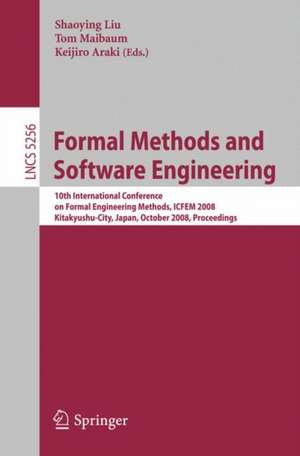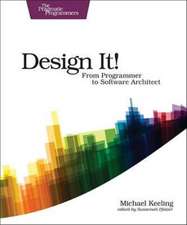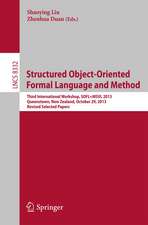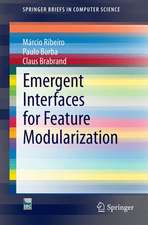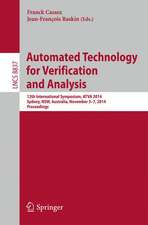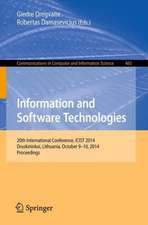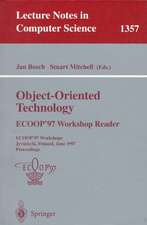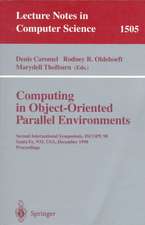Formal Methods and Software Engineering: 10th International Conference on Formal Engineering Methods ICFEM 2008, Kitakyushu-City, Japan, October 27-31, 2008, Proceedings: Lecture Notes in Computer Science, cartea 5256
Editat de Shaoying Liu, Tom Maibaum, Keijiro Arakien Limba Engleză Paperback – 8 oct 2008
Din seria Lecture Notes in Computer Science
- 20%
 Preț: 1061.55 lei
Preț: 1061.55 lei - 20%
 Preț: 307.71 lei
Preț: 307.71 lei - 20%
 Preț: 438.69 lei
Preț: 438.69 lei - 20%
 Preț: 645.28 lei
Preț: 645.28 lei -
 Preț: 410.88 lei
Preț: 410.88 lei - 15%
 Preț: 580.46 lei
Preț: 580.46 lei - 17%
 Preț: 427.22 lei
Preț: 427.22 lei - 20%
 Preț: 596.46 lei
Preț: 596.46 lei -
 Preț: 449.57 lei
Preț: 449.57 lei - 20%
 Preț: 353.50 lei
Preț: 353.50 lei - 20%
 Preț: 1414.79 lei
Preț: 1414.79 lei - 20%
 Preț: 309.90 lei
Preț: 309.90 lei - 20%
 Preț: 583.40 lei
Preț: 583.40 lei - 20%
 Preț: 1075.26 lei
Preț: 1075.26 lei - 20%
 Preț: 310.26 lei
Preț: 310.26 lei - 20%
 Preț: 655.02 lei
Preț: 655.02 lei - 20%
 Preț: 580.93 lei
Preț: 580.93 lei - 20%
 Preț: 340.32 lei
Preț: 340.32 lei -
 Preț: 381.21 lei
Preț: 381.21 lei - 20%
 Preț: 591.51 lei
Preț: 591.51 lei - 15%
 Preț: 438.59 lei
Preț: 438.59 lei - 20%
 Preț: 337.00 lei
Preț: 337.00 lei -
 Preț: 389.48 lei
Preț: 389.48 lei - 20%
 Preț: 607.39 lei
Preț: 607.39 lei - 20%
 Preț: 1024.44 lei
Preț: 1024.44 lei - 20%
 Preț: 579.30 lei
Preț: 579.30 lei - 20%
 Preț: 763.23 lei
Preț: 763.23 lei - 20%
 Preț: 453.32 lei
Preț: 453.32 lei - 20%
 Preț: 575.48 lei
Preț: 575.48 lei - 20%
 Preț: 585.88 lei
Preț: 585.88 lei - 20%
 Preț: 825.93 lei
Preț: 825.93 lei - 20%
 Preț: 763.23 lei
Preț: 763.23 lei - 17%
 Preț: 360.19 lei
Preț: 360.19 lei - 20%
 Preț: 1183.14 lei
Preț: 1183.14 lei - 20%
 Preț: 340.32 lei
Preț: 340.32 lei - 20%
 Preț: 504.57 lei
Preț: 504.57 lei - 20%
 Preț: 369.12 lei
Preț: 369.12 lei - 20%
 Preț: 583.40 lei
Preț: 583.40 lei - 20%
 Preț: 343.62 lei
Preț: 343.62 lei - 20%
 Preț: 350.21 lei
Preț: 350.21 lei - 20%
 Preț: 764.89 lei
Preț: 764.89 lei - 20%
 Preț: 583.40 lei
Preț: 583.40 lei - 20%
 Preț: 649.49 lei
Preț: 649.49 lei - 20%
 Preț: 341.95 lei
Preț: 341.95 lei - 20%
 Preț: 238.01 lei
Preț: 238.01 lei - 20%
 Preț: 538.29 lei
Preț: 538.29 lei
Preț: 339.47 lei
Preț vechi: 424.34 lei
-20% Nou
Puncte Express: 509
Preț estimativ în valută:
64.96€ • 67.99$ • 54.07£
64.96€ • 67.99$ • 54.07£
Carte tipărită la comandă
Livrare economică 31 martie-14 aprilie
Preluare comenzi: 021 569.72.76
Specificații
ISBN-13: 9783540881933
ISBN-10: 354088193X
Pagini: 412
Ilustrații: XI, 397 p.
Dimensiuni: 155 x 235 x 28 mm
Greutate: 0.61 kg
Ediția:2008
Editura: Springer Berlin, Heidelberg
Colecția Springer
Seriile Lecture Notes in Computer Science, Programming and Software Engineering
Locul publicării:Berlin, Heidelberg, Germany
ISBN-10: 354088193X
Pagini: 412
Ilustrații: XI, 397 p.
Dimensiuni: 155 x 235 x 28 mm
Greutate: 0.61 kg
Ediția:2008
Editura: Springer Berlin, Heidelberg
Colecția Springer
Seriile Lecture Notes in Computer Science, Programming and Software Engineering
Locul publicării:Berlin, Heidelberg, Germany
Public țintă
ResearchCuprins
Invited Talks.- How Can We Make Industry Adopt Formal Methods?.- Programmers Ain’t Mathematicians, and Neither Are Testers.- Contract-Based Reasoning for Verification and Certification of Secure Information Flow Policies in Industrial Workflows.- Specification and Verification.- Specifying and Verifying Event-Based Fairness Enhanced Systems.- Modelling and Proof of a Tree-Structured File System in Event-B and Rodin.- Testing.- Conformance Testing Based on UML State Machines.- An Approach to Testing with Embedded Context Using Model Checker.- Requirements Coverage as an Adequacy Measure for Conformance Testing.- Verification 1.- Decomposition for Compositional Verification.- A Formal Soundness Proof of Region-Based Memory Management for Object-Oriented Paradigm.- Program Models for Compositional Verification.- Model Checking and Analysis.- A Unified Model Checking Approach with Projection Temporal Logic.- Formal Analysis of the Bakery Protocol with Consideration of Nonatomic Reads and Writes.- Towards Abstraction for DynAlloy Specifications.- Verification 2.- Partial Translation Verification for Untrusted Code-Generators.- A Practical Approach to Partiality – A Proof Based Approach.- A Representative Function Approach to Symmetry Exploitation for CSP Refinement Checking.- Tools.- Probing the Depths of CSP-M: A New fdr-Compliant Validation Tool.- Practical Automated Partial Verification of Multi-paradigm Real-Time Models.- Application of Formal Methods.- Specifying and Verifying Sensor Networks: An Experiment of Formal Methods.- Correct Channel Passing by Construction.- Semantics.- A Process Semantics for BPMN.- A Formal Descriptive Semantics of UML.
Textul de pe ultima copertă
This book constitutes the refereed proceedings of the 10th International Conference on Formal Engineering Methods, ICFEM 2008, held in Kitakyushu-City, Japan, October 2008.
The 20 revised full papers together with 3 invited talks presented were carefully reviewed and selected from 62 submissions. The papers address all current issues in formal methods and their applications in software engineering. They are organized in topical sections on specification and verification; testing; verification; model checking and analysis; tools; application of formal methods; semantics.
The 20 revised full papers together with 3 invited talks presented were carefully reviewed and selected from 62 submissions. The papers address all current issues in formal methods and their applications in software engineering. They are organized in topical sections on specification and verification; testing; verification; model checking and analysis; tools; application of formal methods; semantics.
